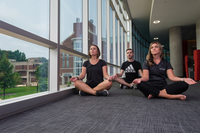Research & Evaluation
Research & Program Evaluation
One of the core activities of the Center is to conduct research and program evaluation in partnership with faculty collaborators and community partners. The Center frequently serves as the tracking and evaluation arm for university partners across a number of disciplines including medicine, environmental health, public health, and engineering. Research utilizes a variety of designs and levels of rigor, from randomized control trials (RCTs) to propensity score matching (PSM) and other quasi-experimental and descriptive designs. The Center highly values a mixed methods approach to research and has built qualitative expertise into its team of staff and faculty consultants. In the area of program evaluation, the Center partners with a wide range of community partners to conduct needs assessments, organizational assessments, formative, and summative evaluation efforts. Examples of these research and evaluation efforts by substantive areas include the following:
Learn more about some of our projects by clicking the titles below.
CFCWB will be assisting in the implementation of eCBT and in the evaluation of services and the assessment of facilitators and obstacles to implementation. Mixed-method approaches to evaluation are utilized, including surveys, validated scales, interviews, and focus groups. The CFCWB will: 1. operationalize outcome measures and data collection methods. CFCWB will work with Recovery Court to confirm or modify these outcome measures as needed, as well as to determine specific methods to be used to collect these data elements. This will include training of staff in data collection, putting measures on-line if applicable, and developing data collection manuals; 2. Manage data collection processes with data elements coming from multiple sources (different providers/agencies, administrative data, chart file review, etc). This will also serve to monitor fidelity of data collection; 3. Analyze outcome data and produce reports for various audiences. Evaluation Implementation in collaboration between: The Department of Justice OVC will fund projects to provide direct services to children suffering from crime due to addiction. The Family Recovery Court model serves this target population, as it provides comprehensive services to families with substance use issues and substantiated cases of child maltreatment. The funding announcement has priority areas of 1)rural areas (2) high poverty areas and 3) Empowerment Zones. There is a strong emphasis on the direct provision of evidence-based services to children. We will utilize the funds to sustain the Jefferson County Family Recovery Court (high poverty and Empowerment Zone priority areas) in partnership with Seven Counties and to establish the Clay County Recovery Court (rural priority area) in partnership with VOA. We will also partner with these and other agencies to build capacity to provide three evidence-based services that have documented effectiveness with sufferers of child maltreatment: adversity focused cognitive behavioral therapy (TFCBT), combined parent child cognitive behavioral therapy (CPC CBT), and telehealth. Additional activities of the grant will include manualization and training of the Recovery Court model for the new site, training and fidelity monitoring for the EBPs for children, comprehensive program evaluation, and dissemination activities. Jefferson Family Recovery Court serves approximately 70 families per year with approximately 100 children; the anticipated sample size for Clay County Family Recovery Court is 35 families with approximately 87 children per year. With two years of active enrollment for the study, the projected sample size is 210 parents and 320 children. Legal Aid has partnered with the CFCWB to conduct a comprehensive needs assessment which includes focus groups and interviews, survey of existing/former clients, and a community outreach survey in order to identify needs and gaps in services that the organization may address. Maryhurst is working to improve outcome measures for their electronic health records system, post-discharge data collection, standardized assessment data from the CANS process, and specialized program outcomes. This effort to improve data operationalization, collection, and analysis can enhance the overall quality of care and effectiveness of programming for youth. Using data collected by Maryhurst staff, the Center for Family and Community Well-Being will analyze various outcomes regarding process evaluation, safety, permanency, well-being and organizational culture and climate. PCAK has negotiated a contract with the CFCWB to do the following: 1. Review of existing data analysis and reports; 2. Advanced analytics and addition al report development; 3. Training of PCAK staff in data analysis and reporting. The evaluation team will assess changes in client outcomes in relation to general well-being, clinical stress symptoms, experiences with intolerance, and protective factors. The evaluation team will also assess client adverse childhood experiences at the onset of treatment, as well as satisfaction with services at the end of treatment.Anti-Separatism Training Evaluation
Evaluating Anti-Separatism psychoeducation groups for faculty, staff, and students at UofL. This project will evaluate the relative effectiveness of anti-separatism psychoeducation groups for approximately 200 participants that include faculty, staff, and students at the University of Louisville. Groups consist of three 90 minute sessions and address:
The study will address the following key research questions:Appalachian Mind Health Initiative (PCORI)
Improving mental health in Appalachia through implementation and evaluation of electronically-delivered therapy. Sponsored by the Patient-Centered Outcomes Research Institute (PCORI), the Appalachian Mind Health Initiative (AMHI) is a partnership between CFCWB, University of South Florida, West Virginia University, and community organizations in Appalachia to enhance mental health services in rural areas through partnering with primary care practices to offer electronically-delivered Cognitive Behavior Therapy (eCBT) for Depression.
Cross-System Assessment Project
Develop and pilot adversity-informed assessment tools for system-involved youth and young adults. The CFCWB partnered with Coalition Supporting Young Adults (CYSA) to identify, train, and pilot assessment tools for mental health, life skills, crisis needs, and goals of system-involved youth and young adults aged 16-24. This Cross-System Assessment project used evidence-based, adversity-informed scales to develop an assessment tool comprised of seven validated scales which measure client needs, strengths, mental health, adverse childhood experiences, and more, as well as incorporating scenarios with each scale to facilitate understanding and practice for practitioners before survey administration. Center for Integrative Environmental Health Sciences Tracking & Evaluation
Evaluation of engagement, collaboration, capacity building, outreach, productivity, and community needs. The CFCWB partnered with the Center for Integrative Environmental Health Sciences to track and evaluate overall outcomes of engagement, collaboration, capacity building, outreach, productivity, and community involvement with a mixed-methods approach that combines quantitative methods (e.g., surveys, standardized scales, archival data) with qualitative methods (e.g., behavioral observation, content analysis). Tracking and evaluation results are used as part of a continuous quality improvement process to enhance programming and better serve the community. As community needs were identified, the CFCWB aided in development and implementation of participatory action research, observation and data collection, analysis, and reporting. Family Recovery Court: Comprehensive Services for Family Centered Reunification
Family Recovery Court offers a comprehensive case management approach for parents with substance use issues whose children have DCBS involvement. Jefferson County Family Recovery Court
Jefferson Family Recovery Court offers a comprehensive case management approach for parents with substance use issues whose children have DCBS involvement. The goal is to support the recovery of parents in order to avoid termination of parental rights when possible and appropriate. Individuals who are identified as eligible and appropriate for Recovery Court receive substance use treatment and mental health treatment, case management, and clinical services for their children.
Eastern Kentucky Family Recovery Court
Key Assets Kentucky Program Evaluation
Evaluating performance, client satisfaction, and needs to enhance services. Key Assets Kentucky (KAK)specializes in offering support services in two distinct areas: residential treatment group home care for youth with autistic and/or developmental impairments, and behavioral health counseling services for youth, adults and families in times of crisis. Key Assets Kentucky is licensed in Central Kentucky and believes in a brighter future for all Kentuckians. Through their two outreach programs, they seek to improve the lives of the clients they serve and their families, by offering high levels of care and support in loving and hopeful environments.
Key Assets has negotiated a contact with the CFCWB to do the following:
Legal Aid Society
Conducting a comprehensive needs assessment to identify needs and gaps for Legal Aid to address. The Mission of the Legal Aid SocietyThe mission of the Legal Aid Society is to pursue justice for people in poverty. We provide free legal services to the most disadvantaged in our community. We fight on your behalf when your health, safety, and stability are unjustly threatened. Last year, Legal Aid helped 4,420 people who had nowhere else to turn.
Maryhurst Program Evaluation
Improve data operationalization, collection, and analysis to enhance the overall quality of care and effectiveness of programming for youth. Maryhurst believes in the worth of children, the strength of families and the power of hope. Maryhurst is dedicated to healing those in crisis through a continuum of innovative and specialized care.
Access Maryhurst Evaluation Tools Prevent Child Abuse KY - Program Evaluation
Improve data analysis, utilization, and reporting to prevent the abuse and neglect of Kentucky's children. The mission of PCAK is to prevent the abuse and neglect of Kentucky’s children through support, education, awareness and training. PCAK envisions building a better Kentucky by shaping our future leaders and their families to ensure Kentucky's children grow up in safe, healthy environments.
TRC Expansion - Evaluation Project
Evaluating adversity interventions for vulnerable Louisvillians experiencing violence. To address the growing crisis of adversarial stress on residents of Louisville’s most vulnerable neighborhoods, the Louisville TRC Project is a city-wide program that seeks to promote resilience and fairness for Louisville’s high-risk youth and families most affected by adversity, violence, and civil unrest. Informed by findings from the TRC Project and the TRC Community Needs and Resources Assessment, the Louisville American Recovery Plan (ARP) Project will evaluate clinical services for individuals experiencing symptoms of stress in South and West Louisville.
Child Welfare
- Children’s Bureau Grant on the National Quality Improvement Center on Reunification Subaward on Family Recovery Court for Treatment of Child Welfare Families with Substance Use Issues to Promote Positive Reunification Outcomes
- Department of Justice Office of Victims of Crime Grant on Family Recovery Court for Treatment of Child Welfare Families with Substance Use Issues in Eastern Kentucky
- Department of Justice Office of Juvenile Justice and Delinquency Prevention Grants on Family Recovery Court for Treatment of Child Welfare Families with Substance Use Issues in Central Kentucky and Louisville, Kentucky
- DCBS and Kempe Center Statewide Partnership to Develop a Differential Response for Public Child Welfare
- Casey Family Foundation Grant on Truth Telling Councils for Youth Who Lived in Foster Care
- Prevent Child Abuse Kentucky Opioid Use Disorder
- Settlement Grant on Assessment and Development of Resources for Communities and Providers
- Prevent Child Abuse America Grant to Develop Poverty Simulation for Child Welfare Affiliated Professionals
- Prevent Child Abuse Kentucky ARP Grant to Conduct Statewide Assessment and Develop Web Based Resource Directory on Fatherhood Resources in Kentucky
- Key Assets Trauma Informed Organizational Training and Assessment Contract
- Maryhurst Contract for Training in EBPs and Assessment of Organizational and Clinical Outcomes
- Coalition for Supporting Young Adults Grant through Office of Youth Development to Train Providers in Assessment of Mental Health Issues
Civic Engagement
- Council on Postsecondary Education Grant on Summer Bridge Program for Underrepresented Students in Social Work
- Department of Commerce Grant on Minority Business Development through Additive Manufacturing
- EVPRI Grant on Turnover and Retention of BIPOC Faculty
- Asia Institute Crane House Grant on Healthcare Systems Navigation by First and Second Generation AAPI Adults
- Gheens Foundation Community Engagement Grant on Creating Resilience among Families Experiencing Homelessness
- Transdisciplinary Social Justice Research Consortium Grant on Anti-Racism Training for Higher Education
- Louisville Metro Public Health and Wellness Division Partnership to Develop LGBTQIA+ Web Based Resource Directory
- Council on Postsecondary Education Grant on Summer Bridge Program for Underrepresented Students in Cancer and Health Disparities (Evaluation)
Health & Well-Being
- Louisville Healthcare CEO Council (CEOc) ARP Grant on Healthcare Workforce Development
- NIH P30 Center for Integrated Environmental Health Science Tracking and Evaluation
- UofL Health UofL Physicians Group Training in Trauma Informed Leadership
- Louisville Metro Public Health and Wellness Division Initiative on Trauma Informed Organizational Assessment and Training
- University Trust Grant: Mixed Methods Study of Challenges and Strategies for Trust in Higher Education
- UofL Surgery Supportive Supervision Training and Evaluation
Mental Health & Adversity
- SAMSHA Campus Suicide Prevention Grant
- PCORI Grant on Appalachian Mind Health Initiative for eCBT to Treat Depression
- Jewish Heritage Fund For Excellence Trauma Grant to Promote Youth Well-Being
- SAMSHA Trauma Resilient Communities Grant (Evaluation)
- ARP Trauma Resilient Communities Grant (Evaluation)
- Western North Carolina Trauma Resilient Communities Organizational Assessment Study
- NSF Pandemic Related Product Acceleration and Responsive Entrepreneurship Program Product Development Grant for Student Athlete Mental Health





